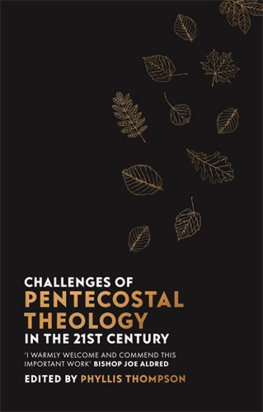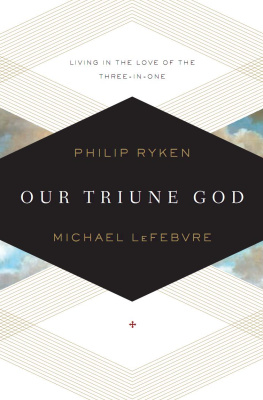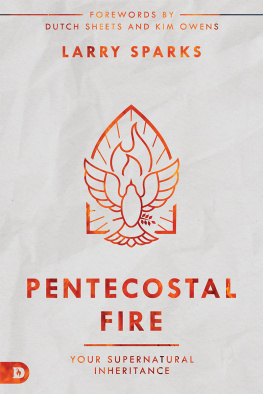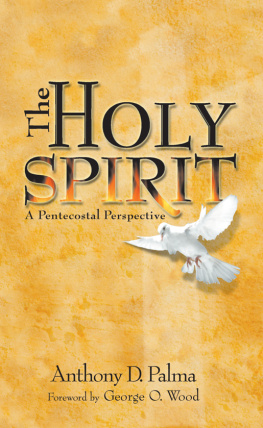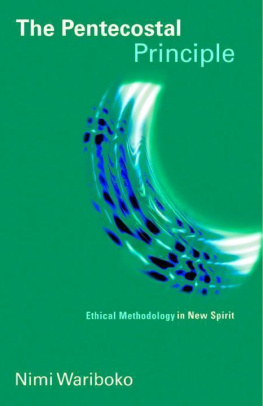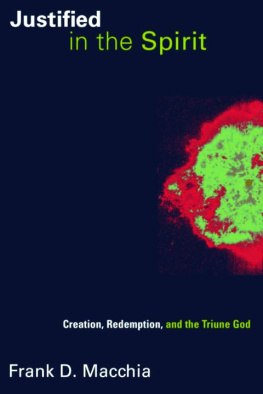
Pentecostal Manifestos
James K. A. Smith and Amos Yong, Editors
PENTECOSTAL MANIFESTOS will provide a forum for exhibiting the next generation of Pentecostal scholarship. Having exploded across the globe in the twentieth century, Pentecostalism now enters its second century. For the past fifty years, Pentecostal and charismatic theologians (and scholars in other disciplines) have been working internally, as it were, to articulate a distinctly Pentecostal theology and vision. The next generation of Pentecostal scholarship is poised to move beyond a merely internal conversation to an outward-looking agenda, in a twofold sense: first, Pentecostal scholars are increasingly gaining the attention of those outside Pentecostal/charismatic circles as Pentecostal voices in mainstream discussions; second, Pentecostal scholars are moving beyond simply reflecting on their own tradition and instead are engaging in theological and cultural analysis of a variety of issues from a Pentecostal perspective. In short, Pentecostal scholars are poised with a new boldness:
- Whereas the first generation of Pentecostal scholars was careful to learn the methods of the academy and then apply those to the Pentecostal tradition, the next generation is beginning to interrogate the reigning methodologies and paradigms of inquiry from the perspective of a unique Pentecostal worldview.
- Whereas the first generation of Pentecostal scholars was faithful in applying the tools of their respective trades to the work of illuminating the phenomena of modern Pentecostalism, the charismatic movements, and (now) the global renewal movements, the second generation is expanding its focus to bring a Pentecostal perspective to bear on important questions and issues that are concerns not only for Pentecostals and charismatics but also for the whole church.
- Whereas the first generation of Pentecostal/charismatic scholars was engaged in transforming the anti-intellectualism of the tradition, the second generation is engaged in contributing to and even impacting the conversations of the wider theological academy.
PENTECOSTAL MANIFESTOS will bring together both high-profile scholars and newly emerging scholars to address issues at the intersection of Pentecostalism, the global church, the theological academy, and even broader cultural concerns. Authors in PENTECOSTAL MANIFESTOS will be writing to and addressing not only their own movements but also those outside of Pentecostal/charismatic circles, offering a manifesto for a uniquely Pentecostal perspective on various themes. These will be manifestos in the sense that they will be bold statements of a distinctly Pentecostal interjection into contemporary discussions and debates, undergirded by rigorous scholarship.
Under this general rubric of bold, programmatic manifestos, the series will include both shorter, crisply argued volumes that articulate a bold vision within a field as well as longer scholarly monographs, more fully developed and meticulously documented, with the same goal of engaging wider conversations. Such PENTECOSTAL MANIFESTOS are offered as intrepid contributions with the hope of serving the global church and advancing wider conversations.
PUBLISHED
James K. A. Smith, Thinking in Tongues: Pentecostal Contributions to Christian Philosophy (2010)
Frank D. Macchia, Justified in the Spirit: Creation, Redemption, and the Triune God (2010)
Wolfgang Vondey, Beyond Pentecostalism: The Crisis of Global Christianity and the Renewal of the Theological Agenda (2010)
Amos Yong, The Spirit of Creation: Modern Science and Divine Action in the Pentecostal-Charismatic Imagination (2011)
Nimi Wariboko, The Pentecostal Principle: Ethical Methodology in New Spirit (2011)
Steven M. Studebaker, From Pentecost to the Triune God: A Pentecostal Trinitarian Theology (2012)
From Pentecost to the Triune God
A Pentecostal Trinitarian Theology
Steven M. Studebaker
WILLIAM B. EERDMANS PUBLISHING COMPANY
GRAND RAPIDS, MICHIGAN / CAMBRIDGE, U.K.
2012 Steven M. Studebaker
All rights reserved
Published 2012 by
Wm. B. Eerdmans Publishing Co.
2140 Oak Industrial Drive N.E., Grand Rapids, Michigan 49505 /
P.O. Box 163, Cambridge CB3 9PU U.K.
18 17 16 15 14 13 12 7 6 5 4 3 2 1
Library of Congress Cataloging-in-Publication Data
Studebaker, Steven M., 1968
From Pentecost to the Triune God:
a Pentecostal Trinitarian theology / Steven M. Studebaker.
p. cm. (Pentecostal manifestos)
ISBN 978-0-8028-6530-4 (pbk.: alk. paper)
ISBN 978-1-4674-3653-3 (mobi)
1. Trinity. 2. Holy Spirit. 3. Pentecostal churches Doctrines.
I. Title.
BT111.3.S88 2012
231.044 dc23
2012038521
www.eerdmans.com
To David M. Coffey, the tinder of my Trinitarian theology
Contents
The seeds of this study completed over the last two years were sown in my first weeks as a doctoral student. I entered Marquette University without the slightest interest in either Trinitarian theology or pneumatology. During my first semester, however, I had the good fortune of taking a course with David Coffey, whose theological acumen was and remains inspirational. In Coffey I saw for the first time how a powerful and comprehensive vision of God could shape the broader theological enterprise. Over the years, in addition to being a significant theological mentor, David has become a dear friend and reliable source of personal encouragement. As a result, my previous studies have borne the unmistakable imprint of his Trinitarian theology. Even so, those familiar with his work will recognize that the theology of this project differs from his in a number of respects. Yet, without the benefit of his insights, his published scholarship, and his dedicated attention to his students, my own contribution would never have been possible. My dedication of this book to David is an expression of personal gratitude to him as a scholar and friend.
I also want to mention D. Lyle Dabney, whose course on pneumatology proved personally and theologically formative. In the course of our first meeting after I had been appointed as his new teaching assistant, I told him that I was a Pentecostal. Dabney challenged me perhaps provoked is a better word to think seriously about Pentecostal theology. When I then confessed my preference for historical theology, he did not exactly rebuke me, but his response was not far from it. Specifically, he urged me to engage in theological reflection as a Pentecostal, and to do so beyond supposedly safe categories of historical and sociological analysis, or tired arguments over the interpretation of Spirit baptism in Luke-Acts. Pentecostals, according to Dabney, needed to develop a theology that was intrinsically Pentecostal, and not a weak imitation of some other position. Initially put off by this bold challenge, I nonetheless eventually saw its wisdom, embraced his call, and even continued as his TA for several more years! I hope that this project in some measure meets his challenge.
Nikola Caric, my own teaching and research assistant, also deserves recognition. I have consistently relied on him, throughout the course of this project, for help in securing sources and editing the manuscript. Bryan Dyer and Jason White have also served as my teaching assistants: although not directly involved in this study, their help with teaching and coursework freed Nick to devote his attention to support my research and writing.
It is a privilege to work with my colleagues at McMaster Divinity College, who nurture an atmosphere of scholarship and collegiality. Mark Boda, in particular, gave guidance on issues related to Old Testament pneumatology and the wind gods. In this respect, I would be remiss not to acknowledge the contributions of Stan Porter and Phil Zylla, president and academic dean, respectively, of the Divinity College. They provided encouragement, institutional support in the form of additional teaching assistants, and a course load that allowed me the time necessary to complete this project.
Next page

